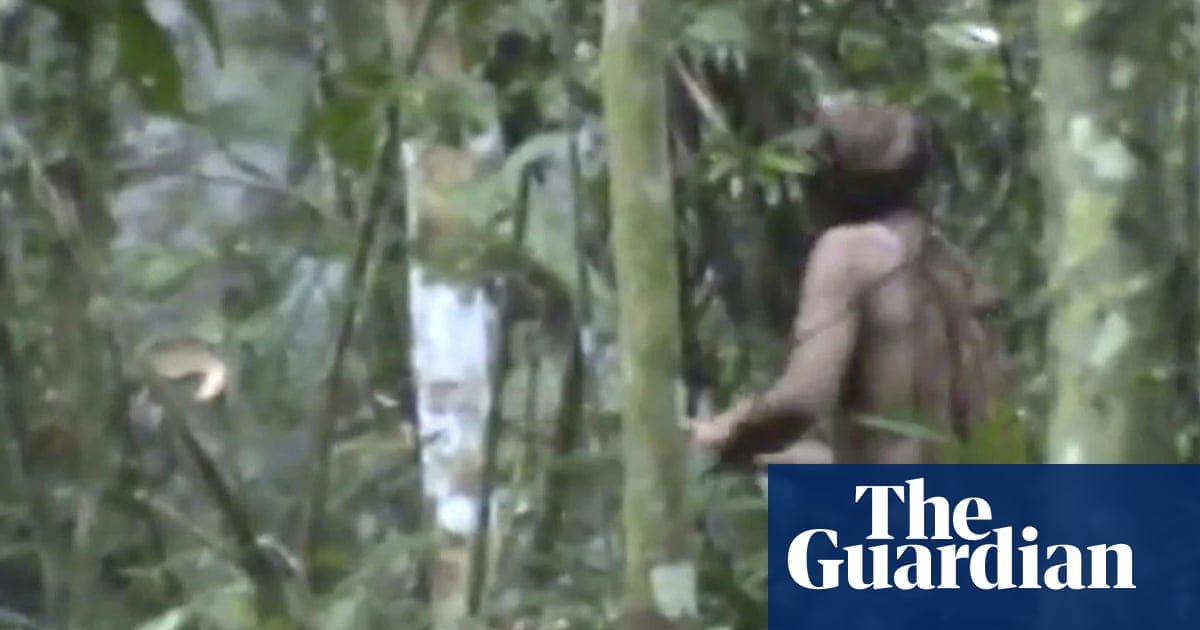For at least 26 years a man known as Tanaru lived alone in a small forest in the south-western Brazilian Amazon, moving around his territory, building several houses, planting crops and hunting. He also dug large, mysterious holes inside his homes.
When a team from the National Indigenous Peoples Foundation (Funai) came across him in 1996, he resisted contact, aiming an arrow at them through a gap in his palm shelter, a scene captured in the 2009 documentary Corumbiara. In 2007, Funai officials made another attempt at contact. Again Tanaru repelled it, leaving one man with a bad arrow wound.
He lived undisturbed for another 15 years as the environmental destruction continued around him in Rondônia, one of Brazil’s most deforested Amazonian states. Some called him the “man of the hole” without knowing why he dug the holes.
In 2022, Tanaru lay down in his hammock and died; Algayer was the one who found him. His death, confirming the extinction of his people, made the future of his 8,000 hectares (19,800 acres) of rainforest contentious. Local lawyers argue against demarcating it as Indigenous land, citing a lack of native population. Government prosecutors insist the territory was historically occupied, so should be protected despite not having Indigenous people left in it. The dispute highlights the complexity surrounding the fight for Indigenous land rights, the impact of historical atrocities, and the ongoing risk to uncontacted people (isolados) in the Amazon.
Don’t let an unfortunate genocide go to waste
- The Business leaders who are very sad
Very Sad® is a registered trademark of EvilCorp™
They probably don’t think it’s unfortunate.
It’s unFORTUNatE because they aren’t currently making a fortune from it.
It’s wonderful that just existing (and not even being conscious or care about it) is enough indirect motivation to live. Something we forgot long ago.
Kind of a similar sentiment is that every human in a community is accepted as valuable, simply because they are human.
We forgot that simplicity when we moved from hunter-gatherer to farming and land ownership.
Yep, owning implies so many things
Yes the land should be protected, just as any other forest in the world. The important thing now is to give me an explanation for the holes, you cannot just bring mysterious holes without anymore explanation! Someone has to dig deeper and find an explanation!
Does a man need a reason to dig a big hole? Some men collect pervy plastic dolls, some collect holes. That’s all.
…Some men collect pervy plastic dolls, some collect holes.
Redundant.
Imagine being the last member of your tribe and unable to connect with any other member of your species. The sexual frustration. It really is the same and collecting sexy dolls.
you cannot just bring mysterious holes without anymore explanation! Someone has to dig deeper and find an explanation!
This winds up with things like the Oak Island mystery.
Same exact thought! They say they may be religious, but I need to know more!! Guess that lore may be lost with the end of this tribe.
Seems to me they’re using the sanctity of indigenous people as a way to protect the rain forest. Wish it being a very important natural part of our planet was enough to protect it, no appeal to human to human empathy needed.
It’s a multifaceted problem.
First, we need to protect forests for the environment and for our survival and health as a species.
Second, we need to protect the lives of other indigenous peoples. Without land protection regardless of the tribe still existing, there’s a perverse incentive for genocide to free up the land.
And finally, we need to prevent multi-national mega corps from gobbling up more land and power.
All these points are important. There’s no need to use fake excuses to push for government protection.
Also very often overlooked: the Amazonas as we know it today is NOT wild in any way. It is a cultural landscape that started around the time when humans settled that area but not later than 11tya
[…] large portions of the Amazon rainforest are probably the result of centuries of human management, rather than naturally occurring as has previously been supposed. https://en.wikipedia.org/wiki/Amazon_rainforest#cite_ref-24
Same with Indigenous Hawaiians, First Nations people in areas of Canada, Mayan people in south-central America, etc …all of whom manipulated the land and waterways to grow a variety of food/medicinal plants closeby.
The sanctity of a lack of indigenous people. Everywhere in the Americas was indigenous territory once, so I don’t see why this land is any different from all the rest. On the contrary, other land might still have a tribe with a historical claim to it, whereas this land clearly doesn’t.
But yeah, a circuitous path to protecting rainforest…




